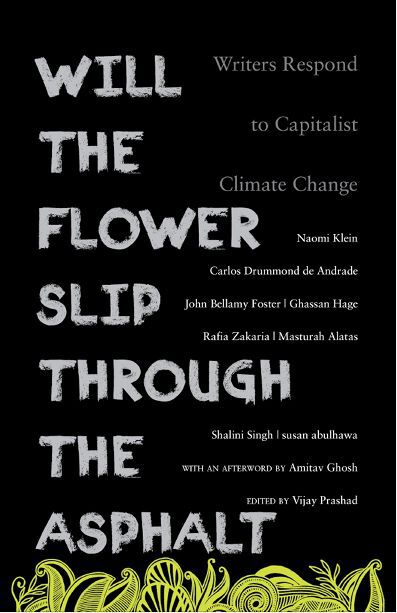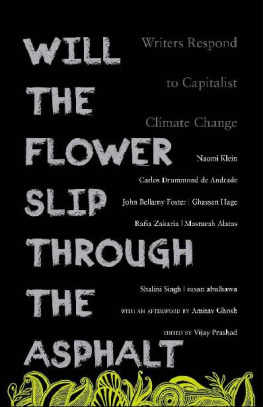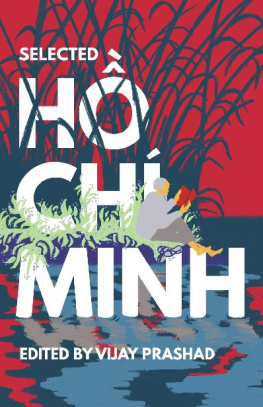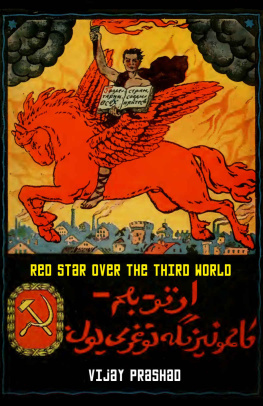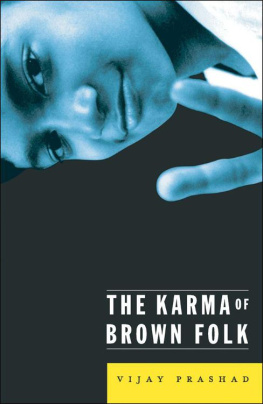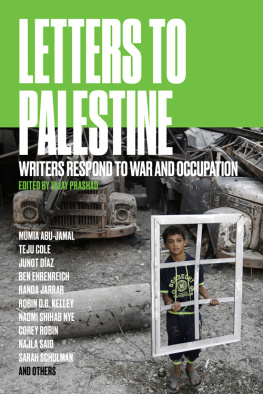Treat the earth well.
It was not given to you by your parents.
It was loaned to you by your children .
native american proverb
Will the Flower Slip Through the Asphalt
Writers Respond to
Capitalist Climate Change
Naomi Klein | Carlos Drummond de Andrade | John Bellamy Foster | Ghassan Hage | Rafia Zakaria | Masturah Alatas | Shalini Singh | susan abulhawa
with an afterword by Amitav Ghosh
edited by Vijay Prashad
Print edition first published in February 2017
E-book published February 2017
LeftWord Books
2254/2A Shadi Khampur
New Ranjit Nagar
New Delhi 110008
INDIA
LeftWord Books is the publishing division of
Naya Rasta Publishers Pvt. Ltd.
leftword.com
ISBN 978-93-80118-50-5 (e-book)
Let Them Drown: The Violence of Othering in a Warming World by Naomi Klein was first delivered as the 2016 Edward W. Said London Lecture and subsequently published in the London Review of Books , June 2016. It republished here with the authors permission, with some modest edits.
What Nutmeg Can Tell Us About Globalization by Amitav Ghosh. Copyright @Amitav Ghosh 2016, used by permission of The Wylie Agency (UK) Limited.
Individual essays respective authors
This collection LeftWord Books
This book is dedicated to
the defenders of the earth and its people,
specifically to two who have been killed
as they stood between the
Future and the Past:
Berta Cceres (1972-2016)
of the Council of Popular and Indigenous Organisations of Honduras
Isidro Baldenegro Lpez (1966-2017)
of the Tarahumara community
Table of Contents
Carlos Drummond de Andrade | A Flor e a Nusea
Imprisoned by my class and my clothes
I go in white through the gray street.
Melancholy men, shopkeepers peer at me.
Should I continue until I sicken?
Can I revolt without arms?
Dirty eyes on the clock tower:
No, the time has not come for complete justice.
It is still the time of feces, bad poems, hallucinations and waiting.
The poor time, the poor poet
Stuck in the same impasse.
In vain I try to explain myself, but the walls are deaf.
Under the skin of words there are ciphers and codes.
The sun consoles the sick, but does not renew them.
Things. How sad are things, considered out of context.
A flower bloomed in the street!
Theyll vomit this tedium across the city.
Forty years and not a single problem
resolved, not even close.
Not a single letter written nor received.
All the men return home.
They are less free but they carry newspapers
and decipher the world, knowing that theyve lost it.
Crimes of the earth, how does it forgive them?
I took part in many, others I hid.
Some I thought were beautiful, they were published.
Gentle crimes, that helped me live.
The daily ration of error, distributed at home.
The feral bakers of evil.
The feral milkmen of evil.
Set it all aflame, including myself.
To the boy of 1918, they called an anarchist.
But my hate is the best part of me.
With it I save myself
And give a little hope to a few.
Far away they pass by, trams, buses,
Rivers of steel traffic.
A flower, though faded
Evades the police, breaks the asphalt.
Be completely silent, stop your business
I swear a flower grew.
Its color is unnoticed.
Its petals arent open.
Its name is not in the books
It is ugly. But it is truly a flower.
I sit on the ground of the countrys
Capital at five in the afternoon
And slowly pass my hand over this fraile thing.
Beside the mountains, dense clouds swell.
Little white points dance on the surface of the sea,
Chickens run in panic.
It is ugly. But it is a flower.
It slipped through the asphalt, the boredom, the disgust and the hate.
From A Rosa do Povo (1945).
Vijay Prashad | Introduction
Isnt our life a tunnel between two clarities?
Pablo Neruda, Libros de las pregutas , 1974
In his final press conference as Secretary-General of the United Nations in December 2016, Ban Ki-moon turned his attention to climate change. The Paris Agreement on climate change is a precious achievement that we must support and nurture, he said. There is no turning back.
Secretary Bans comment there is no turning back was pointed. It comes in the context of the rise to political office of a number of climate sceptics, political leaders who believe either that global climate change is not occurring or who believe that there is little that humans can do to reverse these changes. Such political leaders people like Donald Trump of the United States would like to set aside the 2016 Paris Agreement on climate change. Erik Solheim, the head of the UN Environmental Programme, indicated his concern that some elite American politicians deny science. You will be in the Middle Ages if you deny science.
Denial of climate science is only the symptom of a much deeper problem that confronts the planet. It is the endemic crisis-ridden capitalism that lashes about like an injured dragon, breathing fire here and whipping its tail over there. Fatally wounded, capitalism seeks regeneration through any means whether by the seizure of precious natural resources or the cannibalization of human labour. Whether it is talk of sustainable development or carbon-based development, the common factor here is to increase growth rates by greater exploitation of nature and humanity. The various reports of the UNs Intergovernmental Panel on Climate Change show that human life cannot be sustained if the growth trajectory continues along the path set by capitalism. There is a powerful contradiction between the needs of a parasitic capitalism and its natural and human host. Both cannot survive. One will have to vanquish the other.
The idea that capitalism has no respect for nature and the habitat of our planet has been clear for generations. In a moving letter to her friend Sophie Liebknecht, Rosa Luxemburg wrote on 2 May 1917,
Yesterday I was reading about the reasons for the disappearance of songbirds in Germany. The spread of scientific forestry, horticulture, and agriculture, have cut them off from their nesting places and their food supply. More and more, with modern methods, we are doing away with hollow trees, wastelands, brushwood, fallen leaves. I felt sore at heart. I was not thinking so much about the loss of pleasure for human beings, but I was so much distressed at the idea of the stealthy and inexorable destruction of these defenceless little creatures, that the tears came into my eyes. I was reminded of a book I read in Zurich, in which Professor Sieber describes the dying-out of the Redskins in North America. Just like the birds, they have been gradually driven from their hunting grounds by civilized men.
The Russian Revolution had broken out a few months previously. Tensions in Germany had alerted Luxemburg and her comrades to the possibility of an uprising in the heart of Europe. Luxemburg was in prison, from where she wrote this letter. Why was this revolutionary steeped in the ethos of revolutionary change at the time of great anticipation writing about songbirds? Not because, she told her friend, like so many spiritually bankrupt politicians, I seek refuge and find repose in nature. Far from it, in nature at every turn I see so much cruelty that I suffer greatly. The intimate linkage between capitalisms disdain for the natural world and its scorn for the working-class seemed apparent to Luxemburg. Her ethic was not to bemoan the demise of nature because it would hinder human consumption of the natural world. She was upset by the death of the songbirds because of the necessary linkage in capitalist history between the eradication of nature and the genocide of humans. This was not human nature at work, but the system of capitalism that required nature and humans as resources for the ceaseless profit motive.
